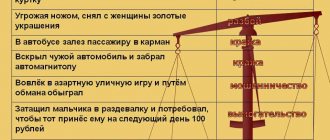Theft is considered the most common crime in Russia. The object of this act is always someone else’s property - a thing belonging to a specific citizen, collective, legal entity or state.
According to Part 2 of Art. 8 of the Constitution of the Russian Federation recognizes and protects all forms of property equally. To qualify this illegal act, it is not necessary to establish the specific form of property that the criminal is encroaching on. It is established when assessing the social danger of the offense committed and is reflected in the case materials along with other grounds. Let's take a closer look in our article at what theft is from a legal point of view.
What is the object of theft?
A mandatory element of theft is a specific object. It is directly private, state, municipal, or other property in relation to which a criminal attack has been committed. Such a crime does not exclude the possibility of encroachment on an additional object, for example, when illegal entry into a home for the purpose of theft is an attack on public relations related to the privacy of citizens, their personal and family secrets.
Item of theft
This includes various property, a list of which is given in Art. 128 Civil Code of the Russian Federation. The Criminal Code of the Russian Federation does not indicate what types of property may be the subject of theft. But it must have the following characteristics:
- material;
- economic;
- legal.
It follows from the powers of the owner that he is a thing that is calculated in number, volume, weight, quantity. The right of ownership is based on the right of possession - physical possession of a thing, as a result of which a citizen can use and dispose of it at his own discretion. Possession is exercised only in relation to a material thing limited in space. For example, the subject of theft cannot be computer information, intellectual property, or electricity. If illegal actions were committed against them, then such actions are qualified as causing property damage to the owner by deception or abuse of trust (Article 165 of the Criminal Code of the Russian Federation), unlawful access to computer information (Article 272 of the Criminal Code of the Russian Federation), violation of copyright and related rights (Article 146 of the Criminal Code of the Russian Federation).
Note!
An object can only be movable things that can move in space without losing their intended purpose and consumer properties. Another property is their estimated value.
It is necessary to distinguish theft from environmental crimes. The correct definition of the social good that the crime is aimed at is of great importance for distinguishing attacks. The subject of theft cannot be natural resources into which human labor is not invested - wild animals, forest, etc. Illegal fishing is qualified under Art. 256 of the Criminal Code of the Russian Federation. Only its removal from an artificial reservoir is regarded as theft.
They are not given documents that give the right to receive property - powers of attorney, invoices, policies, promissory notes, wills. But documents equivalent to money or material assets - postage stamps, coupons for fuel and lubricants, lottery tickets - can be used as an object. This also includes securities - bills, checks, bonds, savings and certificates of deposit, etc. If other securities are stolen, there is no element of theft, such an act is qualified as preparation for fraud.
You can only steal someone else's property. This is a sign that characterizes the legal side of the qualification of an act. It is always owned or legally owned by another person.
The theft of certain types of property, which is withdrawn from civil circulation, forms independent elements of crime. These include psychotropic, narcotic, explosives, ammunition, weapons, radioactive materials, explosive devices.
The concept of theft in criminal law and its signs
Theft in the Criminal Code of the Russian Federation means the theft of someone else's property, that is, things that belong to third parties. An important feature that separates it from other crimes related to the appropriation of other people's things is its secret nature. It does not matter to the court whether the owner was present when the crime was committed or not. The main thing is that the attacker tries to carry out the crime secretly.
The legislation spells out the main features necessary to qualify a criminal act under Art. 158 of the Criminal Code of the Russian Federation.
- gratuitousness. Means that the victim was not compensated for the cost of the stolen items;
- illegality. Actions violate the norms of current legislation;
- seizure of property. Transfer of things of material value from the owner to the criminal. Taking is always carried out without the knowledge or consent of the person owning the property. It is necessary to prove that the culprit has no rights to the stolen items;
- intent to commit an unlawful act;
- The illegal actions of the subject are based on a selfish motive. If, when committing an illegal act, the subject was guided by other motives, the offense of theft will not be formed;
- causing damage. Acts that did not cause material damage cannot be qualified under Art. 158 of the Criminal Code of the Russian Federation.
Another important qualifying feature is the time of completion of the crime.
Note!
In accordance with the Criminal Code of the Russian Federation, the crime is completed from the minute when the perpetrator has the opportunity to dispose of the stolen property at his own request. If the subject has taken possession of property belonging to another person, but cannot use it, the crime, which is provided for in Art. 158 of the Criminal Code of the Russian Federation, it will not happen.
Not every item can be the subject of theft. According to the legislation of the Russian Federation, a crime is formed only if the stolen item has a certain consumer value, expressed in monetary units.
Objective and subjective side of theft
The objective side is a set of characteristics established by law that characterize an external act of socially dangerous encroachment on a protected object. It is a form of action through which the criminal steals property secretly. Signs of theft are:
- the active actions of the perpetrator must be illegal and pose a public danger;
- gratuitousness - the seizure is made without remuneration or with a symbolic payment in the form of a certain amount;
- the theft is carried out secretly;
- only other people's property is confiscated;
- the occurrence of adverse consequences for the owner after the crime committed.
Each individual attribute is mandatory. The theft is considered completed at the moment the criminal receives the opportunity to dispose of the stolen property at his own discretion.
The subject must have three characteristics:
- sanity;
- reach 14 years of age;
- be an individual.
When determining the circumstances of a theft committed by a child under 14 years of age, it may turn out that the crime was committed at the instigation of an adult. In this case, the instigator must be considered the subject of the crime.
If a sane person incites an insane person to commit theft, then the person who instigated the crime is the subject of the theft, as explained by the Plenum of the Armed Forces of the Russian Federation in Resolution No. 29 of December 27, 2002.
The absence of a selfish purpose when taking possession of someone else's property does not constitute theft or robbery. For example, the attacker acted with the aim of temporarily using the property and then returning it to the owner, or he assumed that he had a right to it. The Criminal Code of the Russian Federation provides a separate article for the theft of vehicles without the purpose of theft.
Note!
The direction of intent during theft is distinguished by the goals and presence of selfish motives - the desire of the attacker to meet his own material needs at the expense of someone else's property.
Independent signs of the subjective side of theft are purpose, motive and guilt. The latter presupposes the presence of direct intent in the act, aimed at the gratuitous and illegal seizure of things for use in one’s own favor, or for transfer to other persons for mercenary purposes. A volitional action is performed on the basis of a motive for certain goals set by the criminal. They are served by the conscious motivation of the guilty person, his internal driving force. The criminal makes the decision to commit theft, guided by his own needs and interests. The motive may be revenge, resentment, hooliganism.
Criminal legal characteristics of the crime provided for in Art. 158 of the Criminal Code of the Russian Federation
When considering any crime, it is necessary to analyze its subjective and objective characteristics. The correct definition and description of the elements of theft helps to understand: did the person really commit a secret theft or are we talking about another crime? Therefore, we will consider in detail each element of theft.
An object
Correctly identifying the object of a crime allows not only to determine whether the committed act is criminal, but also to distinguish one crime from another , that is, to correctly qualify the committed actions of a person.
Important! The object of the crime is the interests, benefits and social relations protected by the state from the criminal encroachment of other persons.
Article 158 of the Criminal Code of the Russian Federation is located in Chapter 21, which is devoted to crimes against property. Therefore, the main direct object is property relations.
If a person commits theft with qualifying characteristics, then he encroaches not only on property relations, but also on additional objects. Thus, when committing a theft with illegal entry into a residential premises, the object is the social relations that arise in connection with the implementation of the constitutional right to the inviolability of the home (Article 25 of the Constitution of the Russian Federation).
Item
When committing theft, the item is a mandatory element , since in the Note to Art. 158 of the Criminal Code of the Russian Federation states that the subject of any theft, including secret theft, is only someone else’s property.
Such property must have the following characteristics:
- Physical sign.
Property must have material characteristics, that is, it must be tangible and can be touched. In other words, property in the context of the subject of theft is understood as bodily things.
However, in 2022, a new special qualifying feature was introduced - clause “g” of Part 3 of Art. 158 of the Criminal Code of the Russian Federation, so now electronic money can also be the subject.
- Legal sign.
The property must be alien to the guilty person, that is, not legally owned by him. If Peter takes away the TV set from his wife, which they bought together during marriage, then we cannot talk about the presence of the sign of “someone else’s property.” In this case, actions can be regarded as arbitrariness (if there are signs).
- Economic sign.
The property must have some value, which is expressed in the value of the stolen property.
Subject
Any person can commit theft, but in order for such a person to become the subject of a crime, he must have the characteristics established in the Criminal Code of the Russian Federation. The subject of the theft has the following characteristics:
- Sanity.
At the time of committing the theft, the person must be aware of what exactly he is doing, and also must not have mental disorders that indicate that he is insane.
- Age.
According to Part 2 of Art. 20 of the Criminal Code of the Russian Federation, a person is subject to criminal liability for theft from the age of 14.
Recommended reading:
Commentary of the Supreme Court PP to Art. 158 of the Criminal Code of the Russian Federation (Theft)
Dimensions of theft
Complicity in committing theft
Objective side
According to the design of the objective side, theft refers to the material composition, therefore the objective side of theft includes the following mandatory elements:
- Act.
From the point of view of criminal law, an act can be expressed either in action or inaction. Note to Art. 158 of the Criminal Code of the Russian Federation directly states that theft can only be expressed in an active action, because it is difficult to imagine the seizure or circulation of property committed through inaction. It is important that theft is characterized by secret, illegal and gratuitous actions.
Reference.
The action can be expressed in withdrawal and/or circulation. Seizure is expressed in the fact that the perpetrator takes property from the victim without his consent, that is, the thing is removed from “dominion” (possession).
The treatment is that a person gets the opportunity to use the property as if it were his own, including disposing of it. At the same time, it is necessary that both the seizure and the treatment be permanent and not temporary.
So, if Ivan gets into a parked car to ride in it and then return it to the owner, then we cannot talk about theft. His actions will be qualified as hijacking under Art. 166 of the Criminal Code of the Russian Federation.
- Socially dangerous consequence.
Since the legislator defines the elements of theft as material, the consequence in the form of causing property damage is a necessary element. Such damage is often expressed in the loss of property and can be caused not only to the owner of the property, but also to another owner.
For example, if Peter rents a car, and Ivan kidnaps it. Of course, we are talking about causing property damage to the tenant.
- Causal relationship.
A cause-and-effect relationship between an action and the consequences that occur. It is necessary that it was the person’s actions that led to the property being confiscated and causing damage to the owner.
Subjective side
The subjective side is a certain reflection of the objective side of the crime committed in the mind of the person, that is, the attitude of the perpetrator to the theft committed. Mandatory elements of the subjective side of theft are:
- Direct intent.
Theft is the theft of property committed secretly. When committing secret theft, the perpetrator must be aware that he is secretly taking someone else's property, and understand that he is causing damage to the owner, as well as desire it.
- Selfish goal.
A person commits theft in order to obtain some property benefit either for himself or for others. Acting for selfish purposes, a person seeks to enrich himself and profit from stolen property.
Important! The motive is not a mandatory element of the subjective side of theft, so it can be anything (envy, revenge, risk, etc.). The goal is the final result that the guilty person seeks to achieve, and the motive is a certain reason for which he commits a crime.
For example, Ivan, acting deliberately, steals a mobile phone from Peter’s pocket in order to later sell it and donate it to charity.
In the example given, the goal is the desire to get money (self-interest), and the motive is altruism, since he commits theft to help others.
Consequences
An objective sign of theft is the harm caused to the owner or other owner of the property at the time the crime is completed. Experts consider damage to be only material and equivalent in value to the stolen item. It does not include losses specified in Part 2 of Art. 15 Civil Code of the Russian Federation.
The consequence of the crime provided for in Part 1 of Art. 158 of the Criminal Code of the Russian Federation, is damage in an amount exceeding 1000 rubles. It should not be significant for a citizen, since then the offender will be punished with imprisonment for up to 5 years. If the amount of damage exceeds 250 thousand rubles (large amount), then the punishment includes up to 6 years of imprisonment and a fine of up to 80 thousand rubles. When theft occurred in the amount of more than one million rubles (a particularly large amount), the sanctions are even more severe - up to 10 years in prison and a large fine.
If you need help or legal advice on this issue, contact our lawyers by phone or online.
Qualifying and especially qualifying signs of theft
Let's consider the factors that influence the amount of punishment and are assessed by the court as aggravating.
Committing a crime by a group of persons by prior conspiracy
A crime involving two or more people who have reached the age of fourteen and are aware of their own actions is considered to be committed by a group of persons.
Part 2 art. 35 of the Criminal Code of the Russian Federation is devoted to the description of group crimes. It states that conspiracy should be understood as a preliminary agreement to commit a crime, in the conclusion of which several persons participated.
For the qualification of group criminal acts, the following circumstances are of primary importance:
- whether the roles of the accomplices were distributed;
- what actions each of them had to perform;
- other points indicating a preliminary agreement.
Criminal liability under Part 2 of Art. 158 of the Criminal Code of the Russian Federation occurs if one person is the performer, and others provide him with all possible assistance, and everyone acts within the framework of a pre-agreed role.
The actions of a person who does not take personal part in the commission of an unlawful act, but provides all possible assistance to the perpetrators, are characterized as complicity, expressed in the form of aiding and abetting.
Note!
If the persons acted without a prior agreement, then the provisions of Part 1 of Art. 158 of the Criminal Code of the Russian Federation.
Illegal entry into a home, premises or other storage facility
If a criminal has entered a premises that is someone else’s property, guided by selfish intent, then an increased danger is seen in his actions. It manifests itself in the fact that the subject can cause serious damage to the financial situation of the victim, because things of particular value are stored in apartments or houses.
Practice shows that persons who commit burglaries constitute a separate category of criminals. They have professional criminal skills and are prone to recidivism.
In most cases, theft from a home is carried out in two ways.
- by breaking door or window structures;
- using available means suitable for removing property stored indoors (hooks, fishing rods, etc.). In this case, the act is carried out without physical entry into the home.
If the culprit entered the premises in a legal way, and the intent to commit a criminal act appeared already inside, then the qualifying criteria provided for in this part are absent.









